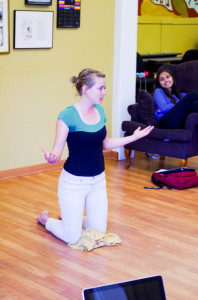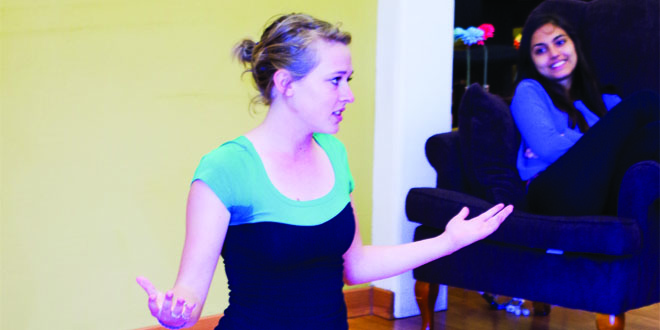
Noemi Berkowitz ’16, director of this year’s annual production of “The Vagina Monologues,” says she has grown accustomed to the word “vagina.”
“I’ve never in my life said vagina so much in a two-month period,” Berkowitz laughed. “It’s a weird word. It’s not a sexy word…but we use it a lot.”
Yet, as Berkowitz – who is a Daily staffer – explains, the use of the word “vagina” is hugely significant, as it is linked to talking freely about female bodies, female sexual experiences and notions of female sexual empowerment. Openly discussing these issues, however, is not yet a comfortable or normalized phenomenon and continues to be an issue today.
Enter “The Vagina Monologues,” which opens its perennial production on Stanford’s campus this weekend.
Originally produced in 1996 by playwright and activist Eve Ensler, “The Vagina Monologues” started as an “episodic play” consisting of a compilation of monologues. Each monologue is typically performed by a different actress and can cover an array of topics around the female experience, including sex, love, rape, menstruation, female genital mutilation, masturbation, childbirth, orgasms, common names for the vagina and more.
“In 1996, this was super revolutionary, because you don’t get a bunch of women standing up and talking about their vaginas,” Berkowitz said.
Eighteen years later, “The Vagina Monologues” has grown to encompass a giant corpus of work, with new monologues added to it each year. Each new production of the show can select a particular set of monologues from within the larger collection to perform. As Stanford has presented an annual spring production of “The Vagina Monologues” for many years, this year’s set of monologues will certainly contain familiar pieces.
“You have some that are silly and some that are really serious, so you have a whole array of different stories that are written to be kind of universal,” Berkowitz said.
However, while the monologues are meant to be universal, Berkowitz encouraged her actresses to personalize their monologues for themselves during the rehearsal process, in an effort to make them believable.
“I urged all of the girls not to go look at YouTube videos of what other people had done, but to really make each monologue her own,” Berkowitz said. “I wanted each woman to create a character and a thorough backstory. I don’t think that these are the same characters necessarily that you might see in another production.”
Jessica Smith ’15, a theater newcomer, became involved in the production through the encouragement of her teammates from women’s rugby. She explained that her monologue is informed by her own life and the experiences of her friends.
“I have really been able to tap into my personal experiences and bring it into the character, because otherwise you feel like you are just reading the words on paper,” Smith said. “I was able to make it my own – I was like, ‘this character is whoever I want it to be.’”
Bonnie McLindon ’14 has seen Stanford’s production of “The Vagina Monologues” every year for the last three years, and will act in this year’s iteration. She performs a well-known monologue entitled “The Flood,” spoken from the perspective of an elderly woman.
“I hardcore channeled my grandmother and decided to do it in a southern accent,” McLindon explained. “I expect my version of ‘The Flood’ to be very different from the version I saw freshman year and different from the versions that take place all over the country. And I think that makes this a very powerful project because it really becomes customized for each community.”
“The Vagina Monologues” is the cornerstone of V-Day, a global non-profit movement that has raised close to $100 million for women’s anti-violence groups through proceeds of “The Vagina Monologues” productions.
Each annual Stanford production of “The Vagina Monologues” is produced through V-Day in combination with the Women’s Community Center (WCC), and 90 percent of the show’s proceeds go to a specific anti-violence group each year. This year’s beneficiary is the TRACY House (Transgender Resources and Advocacy Center for Youth), a Bay Area non-profit dedicated to meeting the underserved needs of transgender youth.
For Berkowitz and many of the actresses involved in this year’s production, charity is just one way by which the production gives back to the community.
Christina Medina ’15, who performs a monologue as Eve Ensler herself in the production, explained her own belief that the show gives a voice to some oft-ignored or silenced issues.
“It talks about a lot of issues that aren’t normally presented. It really gives a voice to domestic violence, abuse, the abuse women face in other countries, reclaiming the word cunt, talking about orgasms and childbirth and more,” Medina said. “It talks about how women shouldn’t be ashamed.”
Echoing that sentiment, McLindon argued that “The Vagina Monologues” does important activist work for feminism and feminist issues here at Stanford, a cause she said is “very near and dear to my heart.”
“This show is activism in that, yes, we have a beneficiary…but also college is a time for women and men who didn’t necessarily have a sex-positive upbringing to get introduced to that and realize what a sex-positive place Stanford can really be,” she said.
Berkowitz said that she wants the same for her production and extended the goal one step further, to calling on audience members to be critical of the 20-year-old work and use it as a springboard to discuss the most pressing issues we face today.
“I want people to think: what is still relevant and what might not be? What is it saying and what is it not saying? What should it be saying? And if there is something left out, write something,” she said. “Write a piece, write a monologue, write a play. Speak up about it.”
Contact Katie Straub at kcstraub “at” stanford.edu.
